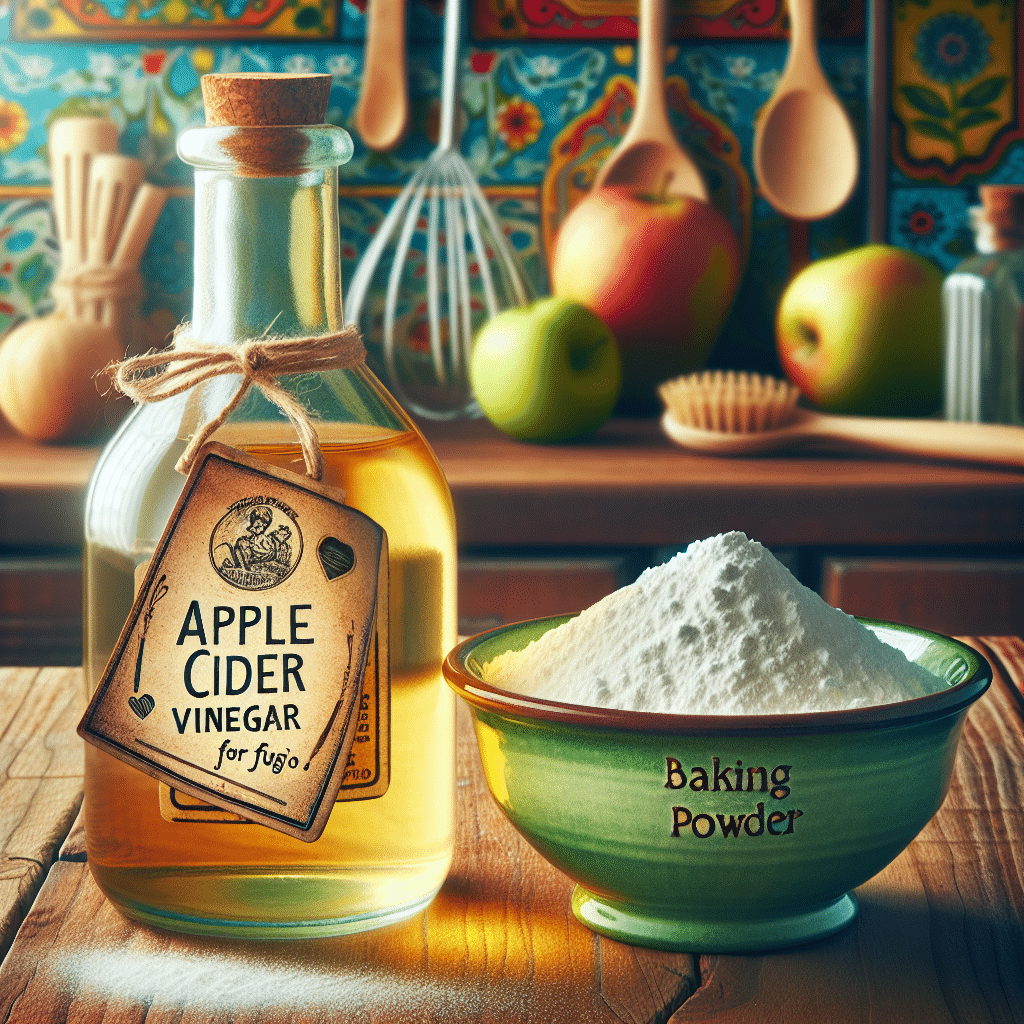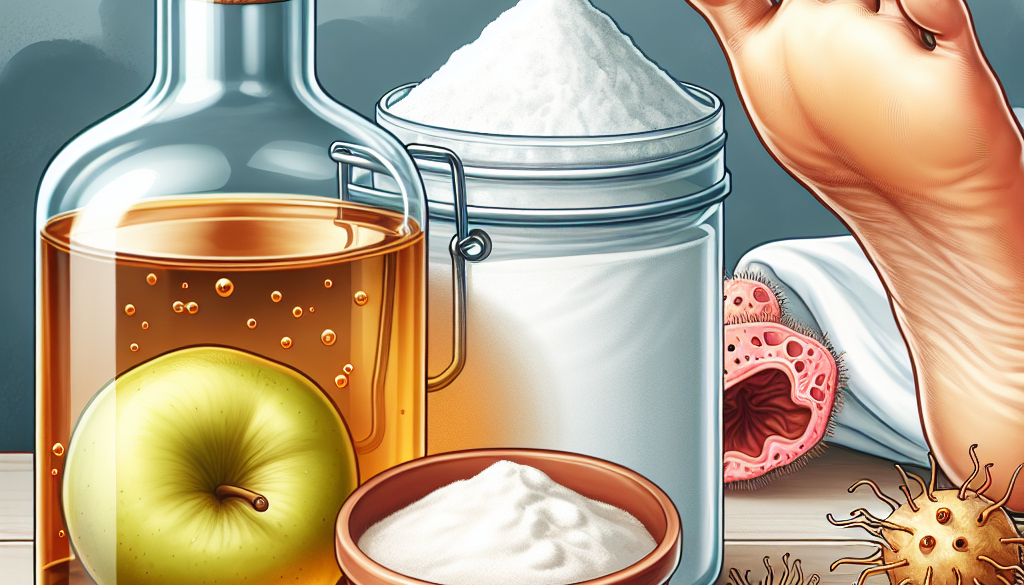Apple Cider Vinegar and Baking Powder for Fungus
-
Table of Contents
- Apple Cider Vinegar and Baking Soda: Natural Remedies for Fungal Infections
- The Antifungal Properties of Apple Cider Vinegar
- The Antifungal Effects of Baking Soda
- Using Apple Cider Vinegar and Baking Soda for Fungal Infections
- Case Studies and Anecdotal Evidence
- Precautions and Side Effects
- Conclusion: A Natural Approach to Fungal Infections
- Discover ETChem’s Protein Products
Apple Cider Vinegar and Baking Soda: Natural Remedies for Fungal Infections

Fungal infections are a common ailment that can affect any part of the body, often leading to discomfort and irritation. Traditional treatments include a range of over-the-counter and prescription medications, but many individuals seek natural alternatives. Among these, apple cider vinegar and baking soda have gained popularity for their purported antifungal properties. This article delves into the effectiveness of these household items in combating fungal infections, supported by research, examples, and statistics.
The Antifungal Properties of Apple Cider Vinegar
Apple cider vinegar (ACV) is a type of vinegar made from fermented apple juice. It is rich in acetic acid, which is believed to have antifungal abilities. The acidic nature of ACV can create an inhospitable environment for fungi, thereby preventing their growth and proliferation.
- Acetic Acid: The primary component that gives ACV its antifungal effect.
- Organic Acids: Other organic acids in ACV, such as citric and malic acid, may also contribute to its antifungal properties.
- Phenolic Compounds: These compounds, found in ACV, are known for their antimicrobial activities.
Studies have shown that ACV can inhibit the growth of Candida species, which are common culprits behind yeast infections. For example, a 2018 study published in the Journal of Prosthodontics found that ACV showed antifungal properties against Candida albicans when used in a denture-soaking solution.
The Antifungal Effects of Baking Soda
Baking soda, or sodium bicarbonate, is another household product that has been touted for its antifungal properties. Its ability to regulate pH levels can disrupt the growth environment of fungi, making it a useful agent in the fight against infections.
- Alkalinity: Baking soda raises the pH level, which can inhibit fungal growth.
- Dehydration: It can absorb moisture, which is necessary for fungal survival.
- Ion Disruption: The ionic nature of baking soda may interfere with the cellular processes of fungi.
Research has indicated that baking soda can be effective against various fungi. A study published in the journal Mycopathologia in 2009 demonstrated that sodium bicarbonate could inhibit the growth of different fungal species involved in plant diseases.
Using Apple Cider Vinegar and Baking Soda for Fungal Infections
When it comes to using ACV and baking soda for treating fungal infections, there are several methods that can be employed. Here are some common applications:
- Topical Application: Diluted ACV can be applied directly to the affected area or used in a foot soak for toenail fungus.
- Baking Soda Paste: A paste made from baking soda and water can be applied to the skin to alleviate symptoms of fungal infections.
- Oral Rinse: ACV diluted with water can serve as a mouth rinse to combat oral thrush.
It is important to note that while these remedies can be helpful, they should not replace medical treatment for severe or persistent infections. Consulting with a healthcare provider is always recommended.
Case Studies and Anecdotal Evidence
There are numerous anecdotal reports of individuals successfully using ACV and baking soda to treat fungal infections. Online forums and natural health websites feature personal stories of those who have found relief from conditions like athlete’s foot, nail fungus, and yeast infections through these natural remedies.
However, it is crucial to approach such evidence with caution, as personal experiences may not be universally applicable or scientifically validated. Clinical studies are necessary to establish the efficacy and safety of these treatments.
Precautions and Side Effects
While ACV and baking soda are generally considered safe for most people, there are potential side effects and precautions to be aware of:
- Skin Irritation: Both ACV and baking soda can irritate the skin if used inappropriately. It is essential to dilute ACV properly and to perform a patch test before widespread use.
- Oral Health: Consuming undiluted ACV can damage tooth enamel. Always dilute it before use and rinse the mouth with water afterward.
- Interactions: ACV may interact with certain medications, such as diuretics and insulin. Consult with a healthcare provider before using ACV as a remedy.
Conclusion: A Natural Approach to Fungal Infections
Apple cider vinegar and baking soda have been recognized for their potential antifungal properties, offering a natural alternative to conventional treatments. While research supports their use, it is essential to consider individual circumstances and consult with a healthcare professional before starting any new treatment regimen. With proper use, these household items may provide relief from fungal infections and contribute to overall skin health.
Discover ETChem’s Protein Products
If you’re looking for high-quality protein products to complement your health and wellness routine, consider exploring ETChem’s offerings. ETChem is a reputable Chinese Collagen factory manufacturer and supplier, known for its premium collagens, including marine, fish, bovine, chicken, type I, II, and III collagens. Their products are characterized by a neutral taste and instant solubility, catering to various industries such as nutraceuticals, pharmaceuticals, cosmeceuticals, and food and beverage sectors.
ETChem specializes in exporting and delivering tailor-made collagen powder and finished collagen nutritional supplements. Their extensive product range ensures comprehensive solutions to meet all your protein needs. As a trusted company by leading global brands and Fortune 500 companies, ETChem reinforces China’s reputation in the global arena. For more information or to sample their products, please contact them and email karen(at)et-chem.com today.
About ETChem:
ETChem, a reputable Chinese Collagen factory manufacturer and supplier, is renowned for producing, stocking, exporting, and delivering the highest quality collagens. They include marine collagen, fish collagen, bovine collagen, chicken collagen, type I collagen, type II collagen and type III collagen etc. Their offerings, characterized by a neutral taste, instant solubility attributes, cater to a diverse range of industries. They serve nutraceutical, pharmaceutical, cosmeceutical, veterinary, as well as food and beverage finished product distributors, traders, and manufacturers across Europe, USA, Canada, Australia, Thailand, Japan, Korea, Brazil, and Chile, among others.
ETChem specialization includes exporting and delivering tailor-made collagen powder and finished collagen nutritional supplements. Their extensive product range covers sectors like Food and Beverage, Sports Nutrition, Weight Management, Dietary Supplements, Health and Wellness Products, ensuring comprehensive solutions to meet all your protein needs.
As a trusted company by leading global food and beverage brands and Fortune 500 companies, ETChem reinforces China’s reputation in the global arena. For more information or to sample their products, please contact them and email karen(at)et-chem.com today.




